
Student Life
If you had to describe PA student life in a word, a good word is "busy." Students have different experiences during their adjustment to life as a PA student. If you performed well in a rigorous undergraduate curriculum, you should be well-positioned to get off to a good start in your professional education.
Our philosophy is that the delivery of healthcare is a team endeavor. Our goal for each class is to develop an atmosphere of cooperation, mutual respect, and life-long learning. Every student brings unique talents, skills and perspectives to our program and we challenge each student to determine how they can help to advance the experience of their class.
Didactic Year
Strong preparation in the basic sciences is an essential component of PA education – the didactic portion of the curriculum is not for the faint of heart. Success requires good time management, organizational skills, and perhaps most of all, determination. While students are studying the basic sciences, a great deal of time is also devoted to the fundamental skill required of a PA: excellence in performing a thorough history and physical examination. Before the first semester is over, students have already performed "H&Ps" on patients in a clinical environment.
The schedule can be irregular at times, but in general classes are between the hours of 8:30 a.m. and 5 p.m. Many students choose to arrive on campus early or stay late for individual or group study. Many students also live together which affords additional opportunities for group work.
Clinical Years
Students rotate through a wide variety of settings to gain a broad exposure to the practice of medicine. The schedule during clinical rotations is established in cooperation with the clinical site and varies widely. Some outpatient settings may have hours of 9 a.m. to 5 p.m. while on your surgery rotation you might not see the sun for days on end. Core rotations are followed by a comprehensive examination to ensure that you have mastered the fundamental principles of each specialty.
Most students find clinical rotations to be a remarkable and rewarding experience. No matter where you intend to work or what specialty you intend to practice the broad training you receive as a PA student will help to ensure you become a competent, flexible and well-rounded clinician.
Location
The IHS campus creates a forward-thinking approach to healthcare education, bringing together future doctors, nurses and health professionals in the fields of medicine, nursing, physical therapy, physician assistant, occupational therapy, athletic training and speech language pathology. View the Interprofessional Health Sciences Campus webpage »
PASSSHU
The Physician Assistant Student Society of Seton Hall University (PASSSHU) is the official student organization for PA students at Seton Hall. Among other activities, PASSSHU promotes fellowship and service to the community. PASSSHU also provides an excellent opportunity for students interested in leadership to develop their skills. PASSSHU elects officers as well as representatives to the state (NJSSPA) and national (SAAPA) associations. The organization is student-run and has organized a wide variety of fundraisers, service activities and social events.
PASSSHU Mission Statement
Our Mission as the Physician Assistant Student Society of Seton Hall University is to promote the personal and professional development of physician assistant students as they prepare to face the many challenges of the profession. The student society shall strive to develop integrity, equality, dignity, and competence among all members.
Through academic achievement, clinical excellence, and community involvement, the student society shall serve as an exemplary advocate of the physician assistant profession. The society shall promote the profession as an integral part of the medical community, focusing on patient care, education and advocacy.

